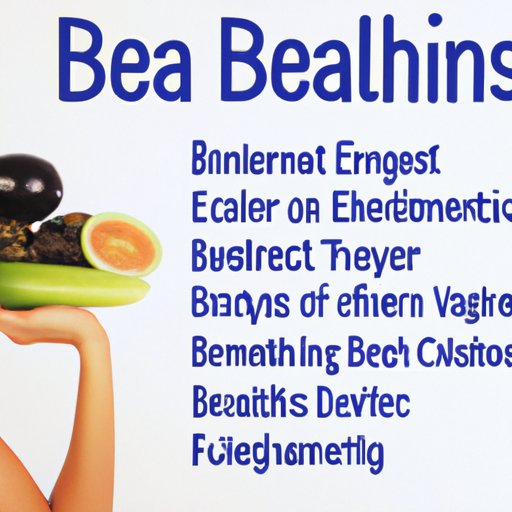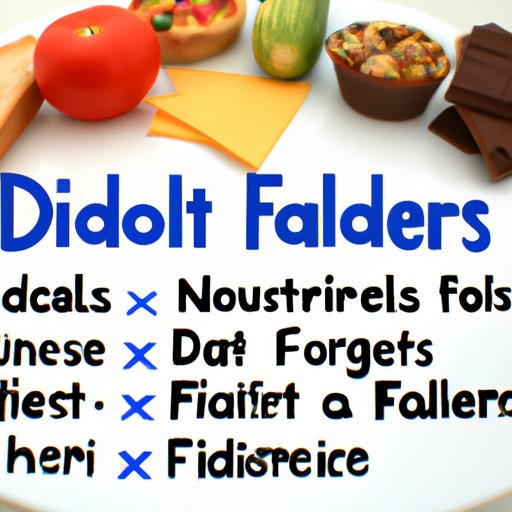Introduction
Eating a balanced diet is essential for overall health and wellness. This type of diet provides your body with all the nutrients it needs to stay energized and functioning properly. But what does a balanced diet look like? And what are the benefits of eating one? In this article, we’ll explore these questions and more, including analyzing popular diets, foods to avoid, healthy recipes, and tips from experts on how to maintain a balanced diet.
Defining a Balanced Diet
A balanced diet is one that includes a variety of foods from all the major food groups. This includes plenty of fruits and vegetables, whole grains, lean proteins, low-fat dairy products, nuts, and healthy fats. Eating a balanced diet ensures you are getting enough of the essential vitamins and minerals your body needs. It also helps maintain a healthy weight and reduces your risk of developing certain diseases.

Benefits of Eating a Balanced Diet
There are numerous benefits to eating a balanced diet. Here are just a few:
- Provides essential nutrients for energy and growth.
- Promotes healthy weight.
- Reduces risk of chronic illnesses such as heart disease, diabetes, and some cancers.
- Improves mental clarity and focus.
- Enhances physical performance.
- Boosts immune system.
Analyzing Popular Diets
Although there are many popular diets out there, they don’t always promote a balanced diet. Let’s take a closer look at four of the most popular diets today.
Pros and Cons of Low-Carb Diets
Low-carb diets, such as the ketogenic diet, involve reducing carbohydrates and increasing fat intake. The idea behind this diet is that reducing carbs forces the body to burn fat for fuel instead. While this diet can be effective for weight loss, it doesn’t provide the full range of nutrients that a balanced diet does. Some potential drawbacks of a low-carb diet include increased risk of heart disease, constipation, and fatigue.
Pros and Cons of Low-Fat Diets
Low-fat diets involve reducing fat intake and increasing carbohydrate intake. This type of diet is often recommended for people who want to lose weight or lower their cholesterol levels. However, this diet can be difficult to stick to in the long run, and it may not provide the same health benefits as a balanced diet. Additionally, some low-fat foods may contain added sugar, which can lead to weight gain.
Pros and Cons of Intermittent Fasting
Intermittent fasting involves cycling between periods of eating and fasting. This type of diet can be effective for weight loss, but it isn’t necessarily balanced. Additionally, intermittent fasting can be difficult to maintain over time and may cause dehydration, nausea, and hunger.
Pros and Cons of Paleo Diet
The Paleo diet is based on the idea of eating like our ancestors did. It involves eating only whole, unprocessed foods, such as lean meats, fish, fruits, vegetables, nuts, and seeds. While this diet can be beneficial for overall health, it can be restrictive and may lead to nutrient deficiencies if not properly planned. Additionally, some of the foods allowed on this diet can be high in saturated fat.

Foods to Avoid When Eating a Balanced Diet
In order to maintain a balanced diet, it’s important to avoid certain types of foods. These include:
Processed Foods
Processed foods are those that have been altered or treated in some way. This includes anything from chips and candy to frozen meals and pre-made sauces. These foods tend to be high in sodium, sugar, and unhealthy fats, and often lack essential nutrients. For a balanced diet, it’s best to limit or avoid processed foods altogether.
Refined Sugars
Refined sugars are found in many processed foods, as well as in some natural foods like fruit juices and honey. Eating too much sugar can lead to weight gain and an increased risk of diabetes and heart disease. When eating a balanced diet, it’s important to limit your intake of refined sugars and opt for healthier alternatives, such as natural sweeteners like maple syrup and honey.
Trans Fats
Trans fats are artificial fats that are created through a process called hydrogenation. These fats are often found in processed foods, such as crackers, cookies, and margarine. Trans fats increase bad cholesterol levels, which can lead to heart disease. For a balanced diet, it’s best to limit or avoid trans fats altogether.
Healthy Recipes for a Balanced Diet
Eating a balanced diet doesn’t have to be boring! Here are three healthy recipes that you can incorporate into your diet for breakfast, lunch, and dinner:
Breakfast
Veggie Omelette: Heat olive oil in a skillet over medium heat. Add chopped bell peppers, mushrooms, and spinach. Cook until vegetables are tender, about 5 minutes. Whisk together eggs and pour over the vegetables. Cook until eggs are set, flipping once. Serve with toast and fresh fruit.
Lunch
Tuna Salad Wrap: In a bowl, combine canned tuna, diced celery, diced red onion, Greek yogurt, and lemon juice. Stir until combined. Spread mixture onto a wrap and top with lettuce and tomato slices. Roll up the wrap and enjoy!
Dinner
Grilled Salmon with Roasted Veggies: Preheat oven to 425°F. Place sliced veggies (such as carrots, zucchini, and red potatoes) on a baking sheet. Drizzle with olive oil and season with salt and pepper. Roast for 25 minutes, stirring halfway through. Meanwhile, heat a grill pan over medium-high heat. Brush salmon fillets with olive oil and season with salt and pepper. Grill for 3-4 minutes per side or until cooked through. Serve grilled salmon with roasted veggies.

Interview with Experts on Tips for Maintaining a Balanced Diet
We asked three experts—a nutritionist, a dietician, and a fitness trainer—for their advice on creating and maintaining a balanced diet. Here’s what they had to say:
Advice from Nutritionists
“To maintain a balanced diet, it’s important to plan ahead. Take some time each week to plan out your meals and snacks for the next few days. This will help ensure that you’re getting all the essential nutrients your body needs. Additionally, make sure to include plenty of fruits and vegetables in your meals, as these are packed with vitamins, minerals, and antioxidants.”
Advice from Dieticians
“When eating a balanced diet, it’s important to listen to your body. Pay attention to how different foods make you feel and adjust your diet accordingly. Also, be sure to drink plenty of water throughout the day to stay hydrated. Finally, don’t forget to include healthy fats in your diet, as these are essential for proper brain function and hormone production.”
Advice from Fitness Trainers
“Exercise is an important part of a balanced diet. Aim for at least 30 minutes of exercise each day. This can include activities like walking, jogging, cycling, swimming, or yoga. Additionally, be sure to get enough rest each night. A good night’s sleep will help you stay energized and focused throughout the day.”
Conclusion
Eating a balanced diet is essential for overall health and wellness. This type of diet provides your body with all the nutrients it needs to stay energized and functioning properly. It also helps reduce the risk of developing certain diseases and can improve mental clarity and physical performance. To maintain a balanced diet, it’s important to plan ahead and listen to your body. Additionally, be sure to limit processed foods, refined sugars, and trans fats. Finally, don’t forget to include healthy recipes and exercise in your routine.
By following these tips and incorporating healthy recipes into your diet, you can create and maintain a balanced diet that fits your lifestyle. With a little planning and dedication, you can reap the many benefits of eating a balanced diet.
(Note: Is this article not meeting your expectations? Do you have knowledge or insights to share? Unlock new opportunities and expand your reach by joining our authors team. Click Registration to join us and share your expertise with our readers.)
